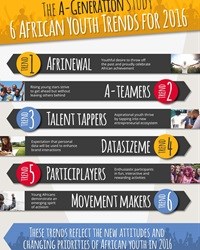
Top stories


ESG & Sustainability#AGES2026: How to back Africa's next-gen green and blue entrepreneurs
Maroefah Smith 2 hours




More news




Burson-Marsteller Africa, a strategic communications/PR firm recognised by The Holmes Report as ‘African Consultancy of the Year’ in 2015, this week, 9 May 2016, introduced The A-Generation Study showcasing six trends that reflect the mind set and changing priorities of African youth in 2016.
The A-Generation Study is the result of intensive workshops facilitated by Burson-Marsteller Africa’s partners in north, west, central, east and southern Africa and the Indian Ocean islands, and attended by a cross- section of participants from predominantly Millennial age groups across diverse industry sectors.
Robyn de Villiers, CEO and chairman, Burson-Marsteller Africa said: “Africa has the youngest and fastest- growing population in the world, and it continues to get younger as populations around the world get older. There are almost 200 million youth in Africa and that number will double by 2045.
“According to African Economic Outlook’s 2015 report, 40% of the continent’s working age population is between the ages of 15 and 24. How they think and what they see as important are critical insights for marketers that want to build brands in Africa.”
Elaine Cameron, head of Burson-Marsteller’s ‘Future Perspective Trend Analysis Group’, added: “The robust A-Generation Study is a cross-border collaboration reflecting a truly pan-African perspective on the continent’s youth. With guidance from Lola Pedro, African regional director at Trendwatching.com, we adapted their trendwatching.com Consumer Trends Canvas to provide the team across Africa with an evidence-based framework for the trends.
“There were notable similarities with what we found in the Indian youth study in 2015, in that both African and Indian youth are keen to be the ones to create change and both are intensely proud of their roots.”
Providing an overview of the trends, De Villiers says, “Empowered by a new, technology-enabled world order and the loosening of previously restrictive social hierarchies, young, cosmopolitan Africans are taking a bold approach to creating their own futures. While the traditional narrative of hardship and struggle still contains some elements of truth, African youth are renouncing these stereotypes and bringing their A-Generation game to the party – providing brands with opportunities for more creative and daring ways of engagement.”
The Burson-Marsteller A-Generation study revealed:
There is a spirit of renewal in Africa where the possibilities and potential of this new ‘frontier’ outweigh the realities of hardship and struggle. The younger generations are proudly African, showcasing the best their continent has to offer. They are self-motivated, self-reliant and bold in wanting to make this happen. And they see it as a collaborative effort where people work together and combine efforts to achieve new recognition for Africa both at home and on the world stage.
In a world of ‘more’ in Africa (more consumerism; more education; more access and connection through technology; more voices able to be heard) there is a hunger to have and own more. But alongside this aspiration for wealth creation, and the dream of improved well-being and quality of life, there are also social concerns and deep-rooted human connections – above all, a feeling that if you are a high-achieving A-Teamer you should also be raising the rest of your team up behind you.
Against a canvas of aspirations, an ‘I want’ attitude, a need to prosper and a need for independence, young Africans are relying less on conventional employment opportunities and adopting a more entrepreneurial mind- set to securing their own futures. They are turning away from traditional support systems (families and governments) to rely more on their own abilities. By tapping into the talent and expertise of others in inspiring innovation, providing funding and mentorship they are projecting their own stamp on how they want to succeed.
A spin-off of greater consumerism across Africa is the growing spirit of ownership that the younger generations are adopting as participants in improving their brand experiences. ‘I matter’ is the message youth are communicating to brands. In the newly-connected Africa, sharing real time information, opinions and insights has become easy for them. This has fuelled expectations that they will be listened to as individuals and that targeted, tailored offerings will personalise and enhance their brand experiences.
Young Africans see themselves not as passive bystanders, but as engaged players in a process, looking for highly interactive brand experiences. In common with youth worldwide, they have limited attention spans and look to engage emotionally in unique and unusual ways. They are looking to build relationships with brands that surprise and delight them but also create talk-ability, giving them a shared platform to get together and have fun. And they want to be thanked for their participation – placing high value on recognition and reward.
During difficult social and economic times, new questions are being asked about what it means to be African and what is relevant to African youth. The status quo is being challenged with heightened social and economic debate. Even if not overtly activist, young consumers are certainly more actively interrogating and debating a wide variety of issues. They are demanding authenticity, transparency and accountability from their chosen brands and role models.
*The A-Generation Study is an interpretation of the young minds that participated in Burson-Marsteller Africa’s workshops in South Africa, Angola, Kenya, Uganda, Nigeria, Cameroon, Senegal, Ivory Coast, Morocco and Mauritius and does not hint at any company/individual personally.